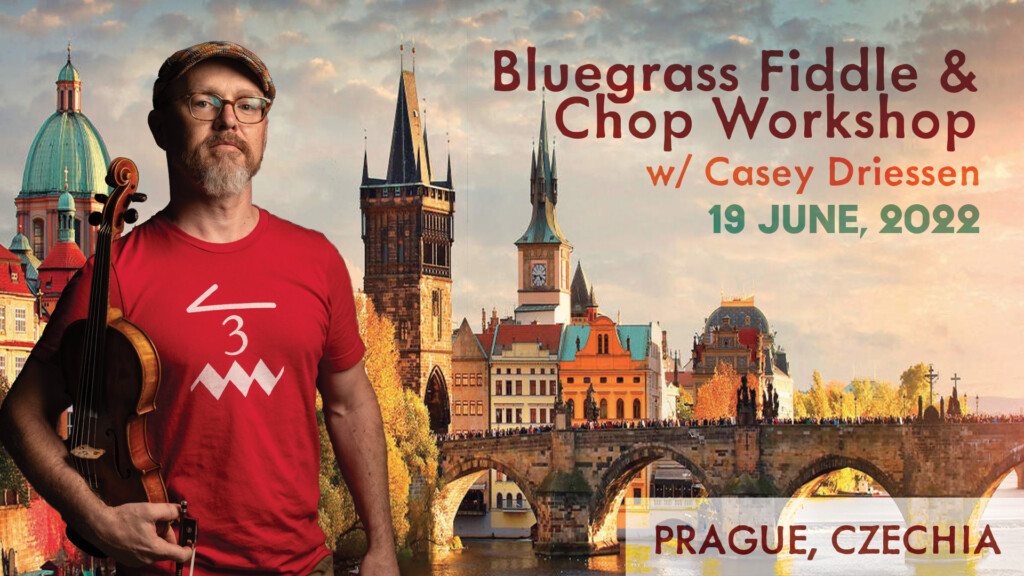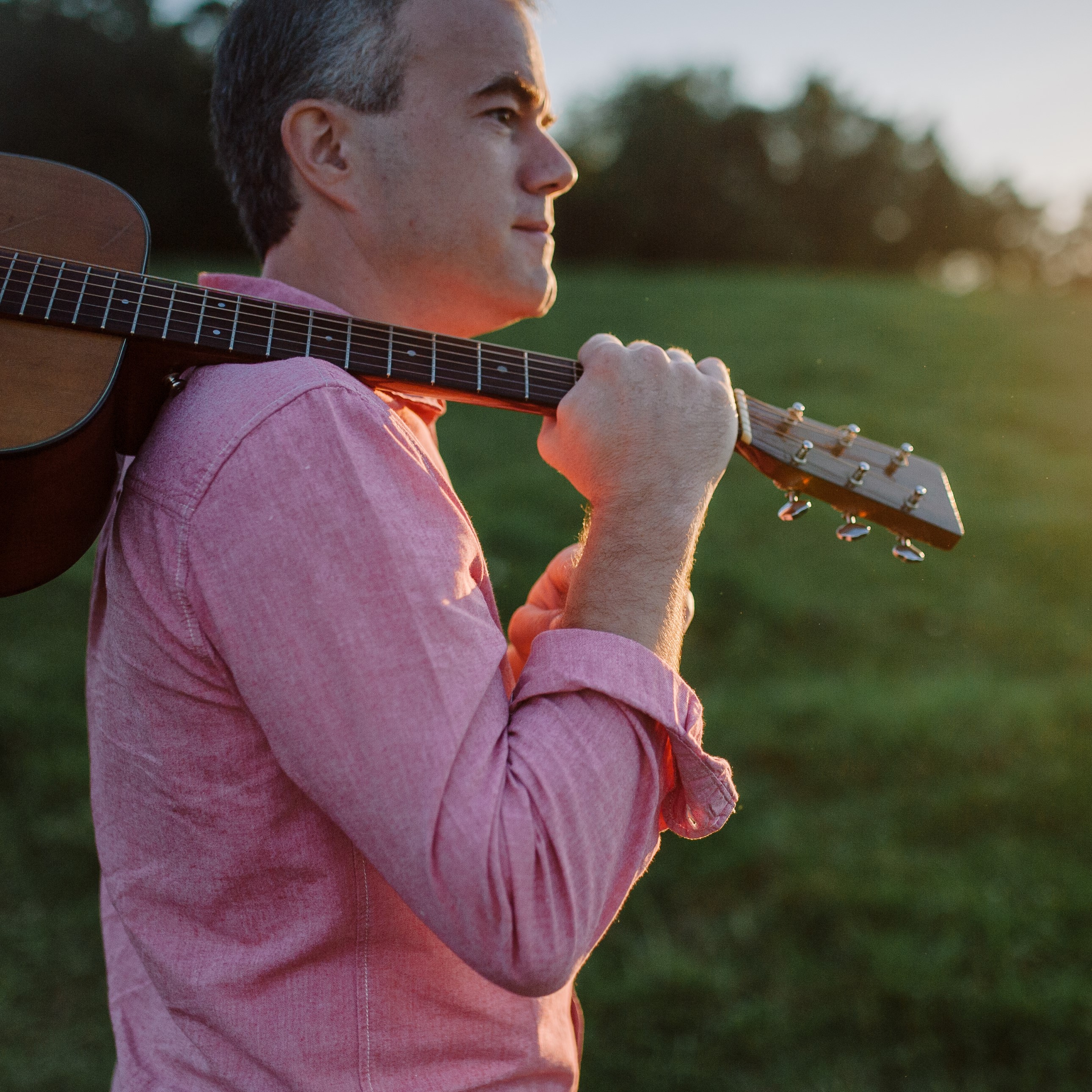Casey Driessen
*1978
American fiddler, composer, producer and teacher
www.caseydriessen.com
Casey, you come from a musical family. You’re a father yourself. How did your parents influence you musically and how do you influence your daughter?
My dad was playing banjo and pedal steel in bluegrass/western swing bands when I was growing up. I play the fiddle because the instruments he played were too heavy for a kid. We spent many weekends during the summer attending bluegrass festivals, more for the jamming community than the stage shows. The rule was that I could stay out as long as I wanted—if I was jamming. I saw lots of sunrises. I tried to teach my daughter music, like my dad taught me, but she didn’t take to it the way I did. Music is still a huge part of her life and has given her a wider view of world cultures. Through music, we have lived in Spain where she met and saw me lead students collaborating from all around the globe. And music was our passport to travel the world as a family for 9 months (before Covid) for my Otherlands project, documenting meetings with musicians from different traditions. She knows music as a path that connects people and has witnessed firsthand so many instruments and languages by the time she was 11.
What other musical influences do you consider essential from your today’s point of view?
Playing music with people, face to face, is more important than ever, especially since that activity was effectively taken away in 2020 and is just now coming back. Online accessibility has opened up amazing access to resources for people to learn—to teachers around the world for sure—but I’m also thinking about playing along with recordings. There are more of those than ever which we can easily find now, but we miss out on the real-time response from other musicians that influences our rhythm, dynamics, and melodic choices. So, don’t forget to jam!
You both play and teach music. Does teaching help you play better? And what do students most often want from you?
I don’t know if teaching helps me play better, but it helps me understand music better as I try to figure out what I’m doing, or what a student needs, and how to communicate it to them. But, I still need to practice to be a better player. Students often come to me for the percussive way that I play, called chopping. But they also come to me for improv, harmony, production, and the methodical way I try to break concepts down into more manageable pieces.
How do you perceive the role of the fiddle in bluegrass music? What does a fiddler need to master in order to fit into a bluegrass band?
Tough question. I think it depends a lot on the instrumentation of the band. From a more traditional bluegrass point of view I think fiddlers can be expected to kick off songs, play breaks, play fills between vocal lines, use double stops, have dependable intonation, have a couple of burning fiddle tunes at the ready, and knowing how to play twin fiddle is an added bonus. What I’ll say next applies to every musician—knowing when it’s your time to shine and when it’s time to support someone else.
My strongest impression from your solo performance in Prague in 2018 was the fascination with the rhythmic aspect of your playing. The wide range of grooves used and the rhythmic precision – these are not typical of “bluegrass” fiddlers. Do you have any drumming background, do you play other instruments, or what is your approach to rhythm (on the fiddle and in general)?
I’ve always gravitated towards rhythm. The first instrument I asked for was a drum kit, but I never learned to play it. When I formed a kid bluegrass band in high school, we didn’t have a mandolin so I took on the role of providing the backbeat…which led me down a lifelong path to becoming a better accompanist, someone that could provide a stable rhythmic and harmonic foundation. I study rhythmic concepts from drumming books, transcribe drummer’s grooves and bass lines, and explore rhythmic concepts from other cultures. Then I write new tunes and grooves, or apply them to fiddle music I already play.

With your playing and projects you step outside of what is considered usual within one genre. I’m referring to the sophisticated style of chopping, combination of acoustic violin and electronics for the one-man-show “The Singularity”, the collaborations within the projects “Fiddle/Sticks” and “Otherlands”. Where do you find the inspiration and energy to explore untrodden paths?
I listen to a wide range of music styles and genres. I suppose my inspiration stems from curiosity of the music that moves me, and how I wish I could participate in that music on my instrument. I like trying to apply concepts from other instruments because it’s exciting and new for me, like a puzzle to solve. And if I follow what moves me, I develop my own voice. I often feel pulled many directions and it can be difficult to decide what I want to explore…there’s just so much I want to try and can see potential in!
Your latest project is called “Otherlands: A Global Music Exploration” – you visited several countries (Spain, Ireland, Scotland, India, Japan and Finland) and recorded with local musicians. Since you also make videos, take photos and write a blog on the road, we can find a lot about the project on your website caseydriessen.com/otherlands (which I recommend to all readers – it’s a great experience, thanks for that!). But what do we not get to read / hear about that was an integral part of the project? It must have cost you an incredible amount of time to communicate, organise and then process it all…
Doing a project like this has been a dream of mine for a long time. I didn’t know how it would actually turn out, or how I would feel about it afterwards—and I learned that I loved it. You’re correct, there’s a lot to organize, communication is not always easy (thankfully there’s music!), and it takes time learning how to live in a new country, but it’s worth it. I found that the musicians I met were as eager to collaborate and share as I was. My family experienced lots of generosity from them. As for mentally/emotionally processing what happened, I think I will do that forever.

One of the things I like about Otherlands is that it can (and hopefully will) have a sequel. Do you plan to explore other countries musically in this way? And what else are you planning?
YES! This project could easily go on for the rest of my life, and I hope it does. The initial one-year family travel concept is not something we can keep doing so I’m exploring what the next phase will be. In face, I’m trying to make the most of a couple trips I have coming up. In May I’ll be in Genoa for some gigs and I’ll meet with local musicians in Liguria and in Sardinia. In June, as you know, I’ll be at the Banjo Jamboree in Čáslav and afterwards I’m heading to the Beskydy region for other collaborations. Stay tuned!
You have collaborated with many top musicians, your project has been nominated for a Grammy, you have admirers and followers all over the world. But what achievement do you value most?
I’d have to say my Otherlands project, not just because of the musical inspiration and all that I learned, but because of what it has given to myself and my family in friendships and cultural understanding.
Why are you making music? What is your personal reason and motivation to play, compose, practice?
Because I don’t feel like the “best me” unless I am.
Thanks for the interview and I look forward to your appearance at the 50th. Banjo Jamboree and the Bluegrass Fiddle & Chop Workshop in Prague!
Me too!


